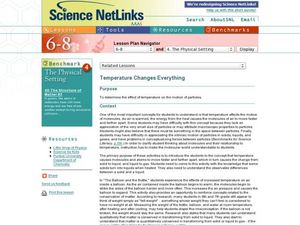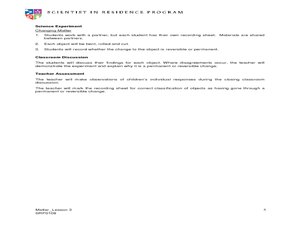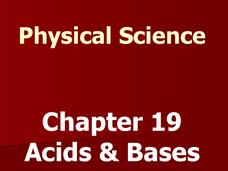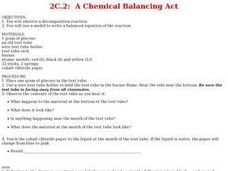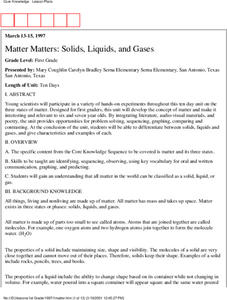Curated OER
What Is the Freezing Point?
Students remove heat energy and determine how it causes a phase change.
Curated OER
Cooling With Sunshades
Students conduct research in order to find the effects of properties exposed to heat and how they change temperature. They consider the effect of sunlight upon objects that are placed outside with the help of an experiment. They also...
Curated OER
The Human Body Study Questions
In this human body study question worksheet, students define 6 words associated with the human body. They answer 8 short answer questions about the organization and function of the organ systems and organization structure of the human body.
Curated OER
Fossils
In this fossils worksheet, students review the different types of fossils including index and trace fossils. This worksheet has 6 matching and 9 true or false questions.
Curated OER
Succession in the Classroom
Middle schoolers investigate their environment by growing plants in class. In this botany lesson, students discuss the lifespan of plants and animals and how they must be cared for continuously over time. Middle schoolers grow a plant...
Curated OER
Temperature Changes Everything
Learners determine the effect of temperature on the motion of particles. They study the difference between particles in a gas, liquid, and a solid and see how the characteristics of solids, liquids, and gases can be explained by particle...
Curated OER
Physical Changes to Matter
Pupils explore matter by conducting an in-class experiment. They experiment with water's various forms by melting and freezing water, identifying its new shape. These observations are recorded to supplement later discussion. They also...
Curated OER
Go To The Head of the Cloud
Students pretend they are water droplets traveling through the water cycle. Using their text, they discover the steps in the cycle and the different paths water can take. They write a report about their journey through the water cycle...
Curated OER
Chemistry Comes to Life
Although biochemistry of the human body is a vital topic, it doesn't have a chapter dedicated to it in many biology textbooks. If that's the case with your text, you can use this resource as a guide for designing your own lecture and as...
Mr. E. Science
Acids, Bases and Solutions
If you are not part of the solution, then you are part of the precipitate. The presentation covers solutions, suspensions, solubility, dissociation, and acid/base reactions. This is the 19th lesson in a series of 26.
Curated OER
Acids and Alkalis
This PowerPoint progresses slide-by-slide through all the facts you would want to deliver about acids, alkalis, salts, and the related lab tests. Each slide has one or two facts about a physical or chemical property or behavior. The...
Curated OER
Introduction to the Mole
Learners are introduced to the mole concept using a discovery-based method. Lesson includes activities with candy that allow students to discover the rules for mole-item, item-mole, mole-mass, and mass-mole conversions.
Curated OER
A Chemical Balancing Act
Students decompose glucose and write an equation for the reaction. In this decomposition reaction lesson plan, students burn a sample of glucose and test the products for water using cobalt chloride paper. They write a balanced equation...
Curated OER
What is a greenhouse?
Students experiment to gain understanding of how a greenhouse retains heat. In this greenhouse lesson, students work with soda bottles and simulate a greenhouse. Students compare data from a vented and intact bottle. Students record and...
Curated OER
Density and Mass
Learners experiment to find which liquids are more dense. In this density and mass activity, students predict and then test objects to observe and measure their density. learners observe which items sink and float. Students complete...
Curated OER
Speeding up the Fizz
Students investigate temperature and chemical reactions. They explore the effect of temperature and particle size has on the rate of a simple chemical reaction. In addition, they graph their results and answer assessment questions.
Curated OER
Matter Matters: Solids, Liquids and Gases
Scientists participate in a variety of hands-on experiments in this ten-day unit on the three states of matter. Lessons incorporate literature, a-v materials, and poetry to help students differentiate between solids, liquids and gases.
Curated OER
pH Scale, acids and bases
Eighth graders define the pH scale, acids and bases. They distinguish between acidic and basic solutions using litmus paper. Students review simple chemical formulas. They define the subscript and coefficient in terms of chemical...
Curated OER
More About Static Electricity
Students examine the concept that static electricity is a phenomenon that involves positive and negative charges. They explore the Static Electricity section of the Science, Technology and Engineering website to learn more about the...
Curated OER
Static Electricity and Lightning
Students study concepts related to static electricity, based on a single example: lightning. They explain how static electricity, lightning, and sparks are all related phenomena. They draw a diagram illustrating the negative and positive...
Curated OER
Carbon Cycle Game
In this carbon cycle lesson, middle schoolers review the carbon cycle and visit stations in the room where they experience every phase in the carbon cycle. Students journal about their journey through the cycle and brainstorm ways humans...
Curated OER
Charge and Electricity
In this electricity worksheet, students read about electric charge, ionic notation, and conductors and insulators. Then students complete 19 matching, 6 fill in the blank, and 2 short answer questions.
Curated OER
Carbohydrates and Fats Crossword
In this carbohydrates and fats worksheet, students complete a crossword puzzle by figuring out the vocabulary words associated with 19 clues given.
Curated OER
Mixtures of Matter
Students experiment with solids and liquids. In this mixtures of matter lesson, students combine matter to form solutions. Students hypothesize, test, and analyze the data to draw conclusions. The lesson can be extended by having...






